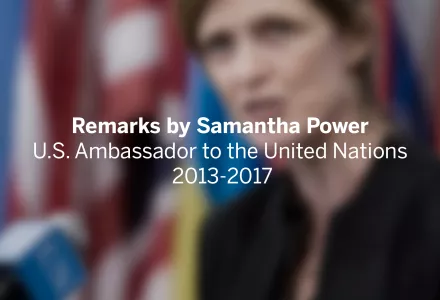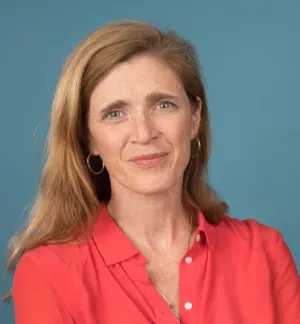
Thank you so much, Madam Secretary, and greetings to everyone. I have always loved birthday parties and I’m very honored to be invited to yours.
But before I begin, I’d like to briefly mention my sadness, many of our sadness at the passing of our wonderful friend Rich Williamson, who was a tireless advocate on behalf of democracy. Even though Rich served on the board of IRI, one of NDI’s sister organizations, I expect he would have agreed with my own assessment that, over the past 30 years, few institutions have labored harder to build democratic solidarity than NDI; no individual has done more to move the democratic conversation from simplistic clichés to real-world solutions than Ken Wollack; and no public figure has done more to put democratic progress at the heart of the global agenda, not to mention at the heart of the U.S. foreign policy agenda, than the incomparable Madeleine Albright.
NDI's accomplishments are legion, but one in particular seems appropriate to recall tonight. In June 1997, NDI brought Catholic and Protestant leaders from Northern Ireland to South Africa to consult with President Nelson Mandela and his colleagues about the challenge of reconciliation. Mandela shared insights about what to do when negotiations stalled. Upon returning to Northern Ireland, one participant called the meeting a “turning point.” "Not a day goes by in our talks,” he said, “that a reference is not made to the South African experience.” Within a year, real peace finally broke out in Northern Ireland. South Africa’s minister of constitutional development called it the first occasion in the history of conflict when a country in the northern hemisphere turned to the south for help. That’s NDI.
In the grand spirit of Mr. Mandela, I would like to focus my remarks this evening not on what has been achieved but on the complex struggle that continues. For despite the gains, concern about the potential destabilizing impact of democracy and democratization is surging, especially in the Middle East, where movements launched in democracy’s name have been accompanied by political unrest and, in Syria, of course, by a horrific civil war. Thus, the question of what the United States should do to advance human rights and democracy is increasingly debated – in the media, among foreign policy experts, and within an American public that is wary of the instability unleashed by the Arab Spring, and weary after more than a decade of overseas entanglements.
In light of these events, we who advocate democracy – we who believe in a U.S. foreign policy that puts human rights and democracy at its center – must deal frankly with three concerns that we hear ever more often. The first is that free elections – at least in the Arab context – empower forces that are better at winning votes than at governing justly or effectively. For example, the argument runs, the recent political openings that made Arab societies less stable without really helping people to enjoy more freedom or more opportunity. The second concern is that, even if we believed democracy would produce good outcomes, we outsiders, we Americans, lack the leverage to influence democratic transitions in a meaningful way. Thus, we should adjust our expectations downward and devote our energy and our resources elsewhere. And the third worry we hear is that Arab democracy, if it does come to fruition, will not truly benefit U.S. interests, because Arabs’ objectives differ markedly from our own. These questions and concerns sound familiar, I see some nodding.
In addressing these concerns, let’s start with the first question about whether it is democracy that fuels instability. In Libya, after 40 years in which Qaddafi banned even the most elementary forms of free expression – where civil society was banned and the penal code authorized the death penalty for advocating change – is it democracy that we should blame for the lawlessness we see today? In Egypt, after decades in which political power was concentrated in the hands of an elite few, where religious and political identities were suppressed, where pluralism was effectively banned, should we hold democracy accountable for the current polarization? In Syria, is it democracy that caused Assad to use SCUDS and sarin gas against civilians sleeping in their beds, or that causes al-Qaeda affiliated groups to behead civilians, aid workers, and journalists? And for people who sometimes sound nostalgic for dictatorship, would it have been tenable then, the beginning of the Arab spring – or is it tenable now – for the United States to align ourselves with those who could only maintain power through bloodshed?
The truth is that what we are witnessing in the Middle East actually strengthens, rather than weakens, the case for more open government. The bloodshed today is a toxic outcome not of too much democracy, it is an outcome of decades in which democracy was absent. When governing institutions are long controlled and twisted by a single group to cater to its own interests, that country’s political system will inevitably be drained of flexibility. There will be no confidence that the losing side in one political confrontation will be given a chance to prevail in the next. Instead of mutual trust, what takes hold is generalized fear. Those without power fear those who wield it. Those with power fear those who want it. And those in the middle fear the clash between the two.
So to those who worry about the impact of democracy on stability, we must insist that they are looking in the wrong direction. Authoritarian rulers offer the counterfeit of stability, the illusion that all is well – provided the jails are full and those at the top remain entrenched.
What authoritarian sorry, excuse me, what authoritarian rulers actually produce is precisely that structural instability that we have been witnessing when – as inevitably happens – their iron grip is loosened and long-suppressed desires and resentments are unleashed.
This leads to the second concern about whether the United States can do much to help democratic transitions succeed. A decade or so ago, many were concerned that our leaders might be attempting too much. A combination of exalted rhetoric and the Iraq war caused some to believe – wrongly – that we planned to impose our own style of government throughout the region. Today, the perception exists – again wrongly – that the United States may be taking a sabbatical from democracy promotion. And there are some who believe this wouldn’t be a bad idea, because there is little effective we can do.
This view is erroneous on both counts.
As Ambassador Rice made clear just last week, in the Middle East but also around the world, the Obama Administration has been a strong supporter of democratic institutions, consistently stressing the value of independent civil society and media, equality for women and minorities, and fundamental human rights. We are working to mobilize a multilateral response to the global crackdown on civil society, which is as urgent as anything happening in the world today.
We have urged greater political openness and a willingness to accommodate opposing views in such countries even as China and Russia, with whose governments we are engaged on complex security issues. The Middle East is no exception. In Iran, as we explore the potential for a diplomatic solution to the nuclear issue, we continue to press for the right of the Iranian people to express themselves freely, including online and through social media, just as their leaders now do. In Egypt, we have withheld some forms of military assistance – an unprecedented step in our bilateral relationship – because we honor the right of Egyptians – all Egyptians – to express their views peacefully. And in the case of Bahrain, we have underscored that long-term stability can only be achieved through national reconciliation and concrete reforms that bring together all parties, including the government and opposition. There, too, we have backed up our words with concrete actions, including, again, the withholding of portions of our military assistance, to press the government to engage in reforms. Inclusion, we have argued, not exclusion, paves the way for the kind of stability that lasts. And it is the responsibility of all sides to create a positive political atmosphere for dialogue, and to denounce violence and sectarian tensions of all kinds.
As to whether our efforts are having an impact, we must of course acknowledge that there are limits to our influence. But when and on what issue has the United States ever had unlimited influence? We know from our history that democracy is not exactly an instant breakfast. We should not be surprised – and we are not surprised – when disputes take place elsewhere over constitutions, political party laws, and the proper allocation of checks and balances.
The kind of diplomatic commitment we are bringing to bear now in the Middle East has been consequential in other contexts: robust U.S. engagement proved critical in facilitating the peaceful referendum that created South Sudan, in encouraging peaceful elections earlier this year in Kenya, and in making possible the re-entry into political life of Aung San Suu Kyi and helping Burma start down the road to democratic transition. Domestic activists are leading campaigns for free and fair elections, for governments free of corruption, for fair and equal treatment under the law – and when they do they continue to turn to the United States for financial support, and for the political leadership they need to protect their space to operate. And where transitions have been accompanied by violence, we know that the tremendous upsurge in international peace-building activities has helped to produce and secure democratic gains in, among other places, the Balkans, East Timor, Sierra Leone, Liberia, Cote d’Ivoire, and Mali.
And already we have evidence that our efforts are making a difference in the Middle East. While the struggle to protect civil society freedoms in Egypt continues, as all of you know, the U.S. and its partners have played an important role in ongoing efforts to keep harmful NGO legislation off the books. In Yemen, we worked with international partners to bring about the end of Saleh’s rule and launch a process of political reconciliation and reform, including the National Dialogue currently underway. Our public and private engagement in Bahrain supported the first-ever independent fact-finding commission invited by any leader in the Arab world. And let us not forget Libya, where we intervened militarily with our allies to protect civilians from a brutal crackdown and where, in recent weeks, the Libyan people have come together to demand the disarmament of militias in Tripoli and Benghazi.
It is obviously hard for any of us to look at recent events in the Middle East and North Africa and to not despair over the extremism and violence that outsiders cannot simply make disappear and that the citizens in these countries never bargained for, when they brought their children dressed in their finest to tell their leaders that they, too, deserve dignity. But looking forward, I know that we will adapt, finding new ways of pressing those who repress and supporting those who advocate for change. We will take our lead from the innovators that you will soon hear from tonight.
In addressing the third concern, it’s true these changes may not always have direct or immediate benefits for the United States. Those of us who promote democracy and respect for human rights harbor no illusions. As change comes to the Arab world, it will express itself in ways that reflect Arab perceptions and hopes. Democracy will not bring about some magical convergence of opinions and interests. But it lays the foundation for open and inclusive debate, in which new thinking is welcomed, old myths are scrutinized, and extreme ideas are weighed against practical solutions to the problems of domestic and international life. The United States may not always be comfortable with the specifics of such a conversation, but the process is one we will recognize, for it is how our own country evolved from its earliest beginnings to where we are today. And over time, our interests are served by these processes, and the foundations that they create for more stable and more open societies.
As we champion democracy, we never forget that America’s support for freedom is the cornerstone of our foreign policy, and it’s the key to our standing in the world. That we stand for something larger than ourselves is America’s comparative advantage. It is what sets us apart from Moscow and from Beijing. And it is what validates our claim to lead and causes others to join with us in making the world more safe, more prosperous, and more just.
So let me once again salute all of you for what you are doing to build and sustain democratic institutions. There is no more important job. Thank you so much.
###
Power, Samantha. “Remarks by Ambassador Samantha Power at the National Democratic Institute's Democracy Dinner.” December 10, 2013


